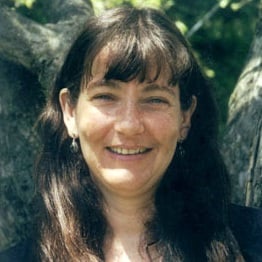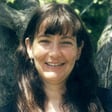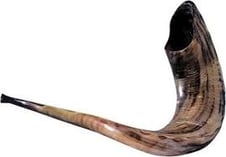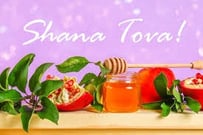Eskaton is pleased to introduce Rabbi Debora Kohn, the rabbi and  spiritual leader of The Reutlinger Community in Danville, California. In addition to leading services and providing spiritual guidance to the residents, Rabbi Kohn also leads discussion and study groups at the community on a regular basis, providing education and spiritual support to community staff, the residents and their family members.
spiritual leader of The Reutlinger Community in Danville, California. In addition to leading services and providing spiritual guidance to the residents, Rabbi Kohn also leads discussion and study groups at the community on a regular basis, providing education and spiritual support to community staff, the residents and their family members.
 This week marks a very important holiday in the Jewish faith. Starting at sunset on Friday, September 18th, Rosh Hashahanah (or the Jewish New Year) celebrates the birth of the world and the creation of humanity. We’ve asked Rabbi Kohn to offer some insight into this High Holy Day for those who are unfamiliar and want to know more.
This week marks a very important holiday in the Jewish faith. Starting at sunset on Friday, September 18th, Rosh Hashahanah (or the Jewish New Year) celebrates the birth of the world and the creation of humanity. We’ve asked Rabbi Kohn to offer some insight into this High Holy Day for those who are unfamiliar and want to know more.
What is Rosh Hashanah?
Rosh Hashanah celebrates the birthday of the Earth, the universe and the creation of Adam and Eve. This year, we celebrate the coming of the year 5781! Literally translated as “The Head of the Year,” this holiday last for two days, starting at sunset on the 18th of September and ending with the sunset on Sunday, September 20th. Together with Yom Kippur (“The Day of Atonement,” celebrated this year on September 28th), Rosh Hashanah is part of the Yamim Nora’im, or “Days of Awe.” These are more commonly known as the Jewish High Holy Days (or Holidays). The ten days in between are known as Aseret Y’may T’shuvah, or the ten days of repentance. Those who observe the Jewish faith use this time for self-reflection and repentance, particularly for those wrongs they’ve perpetrated against their family, friends and neighbors. It is a time to seek forgiveness and to grant it.
Since it is not always easy to honestly reflect on those wrongs you’ve committed in the previous year, we start preparing for the holiday a month in advance. This is known as the month of Elul, or the last month of the year. All month we pray and prepare ourselves for the act of repentance and the cleansing and refreshing of our hearts and minds. It’s also a time to seek out new beginnings and to celebrate the return to your higher self.
What traditions are observed during Rosh Hashanah?
One of the more prominent traditions of Rosh Hashanah is the blowing the shofar  (a ram’s horn) during the synagogue services. The horn is blown at least 100 times, and there are three types of sounds we create with the shofar: tekiah (a long sob-like blast), shevarim (a series of three short wails) and teruah, (short, piercing staccato bursts, usually in a series of 9 or more). The blowing of the shofar represents a few things. It is representative of the trumpet blast that is sounded at a king’s coronation, it recalls the story of Abraham and Isaac, and it serves as a call to repentance. It is meant to “wake up” our soul.
(a ram’s horn) during the synagogue services. The horn is blown at least 100 times, and there are three types of sounds we create with the shofar: tekiah (a long sob-like blast), shevarim (a series of three short wails) and teruah, (short, piercing staccato bursts, usually in a series of 9 or more). The blowing of the shofar represents a few things. It is representative of the trumpet blast that is sounded at a king’s coronation, it recalls the story of Abraham and Isaac, and it serves as a call to repentance. It is meant to “wake up” our soul.
 During Rosh Hashanah, we traditionally gather with friends and family to enjoy a big meal together. The round challah bread, usually made with raisins, symbolizes the continuing circle of life and the return to the beginning. We eat sweet things, like apples dipped in honey and other treats to symbolize our wishes for a sweet year. We also light candles in the evening and try to refrain from working during the two days of Rosh Hashanah.
During Rosh Hashanah, we traditionally gather with friends and family to enjoy a big meal together. The round challah bread, usually made with raisins, symbolizes the continuing circle of life and the return to the beginning. We eat sweet things, like apples dipped in honey and other treats to symbolize our wishes for a sweet year. We also light candles in the evening and try to refrain from working during the two days of Rosh Hashanah.
Why is Rosh Hashanah important?
Rosh Hashanah is important in the Jewish faith because it is a time to reflect on your words and actions over the last year and an opportunity to rectify the mistakes you’ve made. It also is a way to “set ourselves up” for the year to come. It is a time of prayer, to ask for peace and prosperity, and it’s a time to celebrate God and his kingship. During Rosh Hashanah, we can all earn a fresh start. Our hearts and spirits are renewed and refreshed. The process of t’shuvah--repentance, the process of reconnecting to our highest self—“the spiritual mentality” tells us to put love and commitment above self-interest and above whatever feels good at a certain moment. It encourages us to think that the final criteria of goodness is not what “feels right” at this moment. It is also offers a chance to be with our loved ones and our community, and celebrate our peoplehood together in the spirit of new beginnings.
Shanah tovah and L’Shana Tovah Tikatevu Ve Techatemu - May it be a good year and may we all be inscribed in the book for a good life.
We wish all of our family at The Reutlinger Community a prosperous and joy-filled year!

